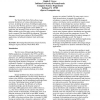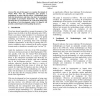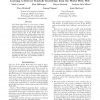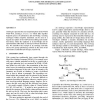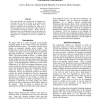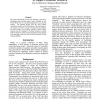ISCAICIS
2000
14 years 3 months ago
2000
The World Wide Web (Web) offers a large potential for delivery of various information-based services, including the services of intelligent applications. As access to the Web has ...
ECIS
2000
14 years 3 months ago
2000
The aim of this paper is to examine the domain of World Wide Web site development and propose a methodology to assist with this process. Methodologies have both their proselytizers...
VIP
2003
14 years 3 months ago
2003
The creation of hypertext and World Wide Web provided a powerful mechanism for organizing and distributing the warehouse of information. However, video-based hypermedia may repres...
AAAI
1998
14 years 3 months ago
1998
The World Wide Web is a vast source of information accessible to computers, but understandable only to humans. The goal of the research described here is to automatically create a...
WSC
2004
14 years 3 months ago
2004
Ontologies represent the next important phase of the World Wide Web, creating a semantic web which links together disparate pieces of information and knowledge. Creating ontologie...
MAICS
2004
14 years 3 months ago
2004
This paper describes the development of algorithms for extracting the title and the names of the authors from documents available on the World Wide Web. In this paper we describe ...
MAICS
2004
2004
Creation of a Style Independent Intelligent Autonomous Citation Indexer to Support Academic Research
14 years 3 months ago
This paper describes the current state of RUgle, a system for classifying and indexing papers made available on the World Wide Web, in a domain-independent and universal manner. B...
ISSA
2004
14 years 3 months ago
2004
The World Wide Web (WWW) is fast becoming the central location for goods, services and information. The very factors that make the Internet such a powerful medium combine to make ...
IC
2004
14 years 3 months ago
2004
With the explosion of the Internet the World Wide Web today has become an infinite source of information. Hence, it is important that one be able to categorize, understand and be a...
FLAIRS
2006
14 years 3 months ago
2006
The World Wide Web provides a wealth of data that can be harnessed to help improve information retrieval and increase understanding of the relationships between different entities...
